The Significance of Bridesmaids and Magic Mike in a Sea of Masculinity
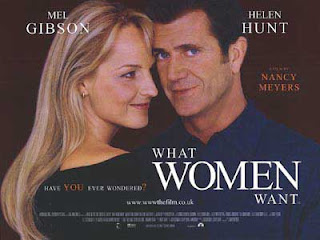 |
| Not this. |
In Christopher Hitchens’s infamous essay, “Why Women Aren’t Funny,” he points to a Stanford study that rated men and women’s reactions to cartoons on a “funniness” scale. The study found many similarities between men and women’s responses, but also found some marked differences. The author of the original report said, “Women appeared to have less expectation of a reward, which in this case was the punch line of the cartoon… So when they got to the joke’s punch line, they were more pleased about it.”
When people–especially an entire group of people–have low expectations, and don’t expect “reward” from their entertainment, certainly this is the set-up of a self-fulfilling prophecy, leaving women pegged as unfunny, unable to get jokes, and generally un-stimulated by what the normal audience (men) is stimulated by. Hollywood has been working under that framework for too long, and women have learned to expect that men’s stories are the norm, and women’s stories are just for women.
However, two summer blockbusters–Bridesmaids in 2011 and Magic Mike in 2012–have proven that when women are rewarded, they are indeed pleased.
While one can easily find wider representation in art house movie theaters, commercial, blockbuster films for the masses have long been entrenched in a sexist Hollywood boys’ club. While these commercial films had flaws, the audience support and huge profits should teach Hollywood a lesson about what women want.
Bridesmaids broke the mold of the R-rated comedy genre by being about women and from a woman’s point of view. While raunchy, raucous comedies about men and men’s stories have been dominating the big screen for years, a modern counterpart with a female protagonist was an anomaly until Bridesmaids. Judd Apatow, baron of bromance, asked Kristen Wiig for script ideas, and she and her writing partner Annie Mumolo created Bridesmaids, and Apatow produced it.
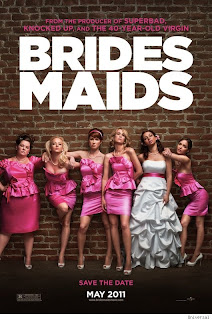 |
| Bridesmaids featured a female protagonist and told a uniquely female story, while still attracting and entertaining male audiences. |
Before the film was released, many were pushing going to see it on opening weekend as a “social responsibility,” as box-office activists knew that the numbers had to be there for studio executives to trust that a blockbuster from a woman’s point of view can work and be profitable. And it was. Bridesmaids went on to become Apatow’s highest-grossing film, and the top R-rated female comedy ever.
Within weeks, female comedy was said to have made a “comeback,” and there was already talk of a sequel. Certainly money talks, but audiences–men and women–genuinely found the film hilarious and engaging.
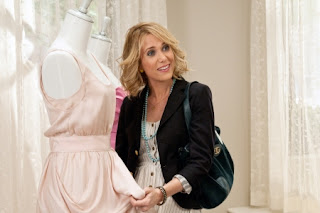 |
| Kristen Wiig co-wrote the film. |
Melissa Silverstein, in her piece “Why Bridesmaids Matters,” noted the high stakes of the film. In an interview after the film was a solid success, Silverstein said, when asked what the “promised land” might look like after Bridesmaids’ success, “We have been in the desert for so long that we don’t even know what the promised land looks like. Women have been so beaten down that they are happy with one success and are looking to build from there… If women could figure out how to band together and make more films a success, maybe the promised land will be in view sooner rather than later.”
Female audiences were desperate for this kind of a film. As the campaigns for opening-weekend attendance showed, the expectations weren’t even that high, but the fight for more female comedies lured audiences in. The fact that it was entertaining was a plus.
A little over a year later, (heterosexual) women flocked to their local theaters in droves to see what they hoped would be naked, grinding, gyrating men on the big screen. But wait–just as women aren’t supposed to be funny, they certainly aren’t supposed to flaunt sexual desire (and women aren’t visually stimulated, right?). Wrong again. Steven Soderbergh built it, and women came.
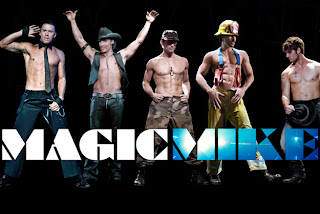 |
| Magic Mike proved the female gaze is alive and well. |
The marketing leading up to the film’s release didn’t always focus on drawing in women with butts and thrusts. Up until a few weeks before the release, the trailer was selling a familiar rom-com. Then came the international and red band trailers, which left the internet buzzing with anticipation for the film.
In its first weekend, the film made seven times its production budget, and women-dominated audiences crowded theaters. In what, anecdotally, is a perfect description of the audience, Dodai Stewart wrote at Jezebel that “they were positively giddy about seeing some naked dudes.”
The most common complaint by women about the film is that there was too much story. They wanted more stripping. What was that about what women want?
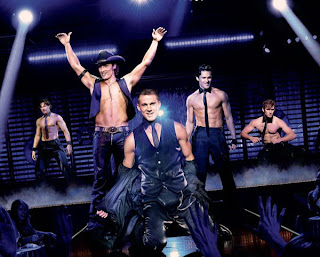 |
| Many audience members were disappointed that there wasn’t more stripping. |
Just as there was a collective outburst of laughter last summer, this summer brought audiences to a collective climax, proving to Hollywood that women aren’t just in the game to watch The Notebook or accompany their boyfriends to see Transformers. Women as audiences have agency and want women’s stories and men’s bodies just as much as men want men’s stories and women’s bodies. For too long, women have had to settle for what men want (or are presumed to want).
In a recent conversation in The New York Times, critics A.O. Scott and Manohla Dargis bring up the success of the two films. Scott says to Dargis:
“You note that Magic Mike owes much of its box office potency to its popularity with women. As you suggested in your review it’s a ‘woman’s picture’ in two potentially radical ways. It caters to the kind of visual pleasure — the delight in ogling beautiful bodies in motion — that film theorists have long associated with the male gaze. And it tells what would have been, in an earlier era, the story of a woman, a good-hearted, hard-working striver selling sex appeal, pursuing dreams and looking for true love in difficult circumstances. The stuff of classic melodrama but with a hard-bodied hero in place of the softhearted heroine… Last summer the power of the female audience — and also perhaps the renewed willingness of male moviegoers to seek out stories about women — was demonstrated by the success of Bridesmaids… But something feels different about this year, and it may just be that such movies feel less anomalous, less like out-riders in a male-dominated entertainment universe. The ground may have shifted a little.”
Dargis answers, “Only if there’s enough money… The successes are promising, but I am going to wait until the numbers improve before I celebrate.”
As Dargis notes, we must not celebrate too quickly. Are these films perfect specimens of feminist film? Of course not. Both are entirely heteronormative. Bridesmaids‘ gross-out scenes felt clunky and out of sync (Apatow “retooled” some of Wiig/Mumolo’s script in places), and it didn’t pass the Bechdel test with flying colors. The first nudity the audience sees in Magic Mike are Olivia Munn’s breasts (this male blogger, giving straight men reasons to go see it, includes all of the female nudity and the fact that it’s told from a man’s perspective). Magic Mike is largely told from a male gaze (men created and filmed it); it’s simply that the female gaze pushed and forced itself into the room. It also relies on the tired story line that women just want to save or fix men.
But for now, the promised land looks a little closer. Perhaps the success of these films is a mirage in the desert, but we can hope that a new age of blockbuster films awaits us–one where women’s stories are told as simply stories, and women’s sexuality is celebrated. For too long, women have been cast aside as objects, as accessories. They are ready to be the subjects. If ticket sales mean anything, which we know they do, Hollywood should take note.
—
Leigh Kolb is an instructor at a community college in rural Missouri. She teaches composition, literature, and journalism courses. While working on her MFA in creative nonfiction writing, Leigh was the editor of a small-town newspaper. In her academic and professional life, she’s always gravitated toward the history and literature of the oppressed, and wants to see their stories properly inserted into our cultural dialogue. She believes that critically analyzing popular media is an important step in opening those conversations. Leigh lives on a small farm with her husband, dogs, cat and flock of chickens.

It’s funny how your review reminded me of Bhaji on the Beach. It’s an all female Asian cast and it has men’s striptease, and even the striptease is funny as hell. I guess it was well ahead of its time.
http://youtu.be/nuRB-YOdC98